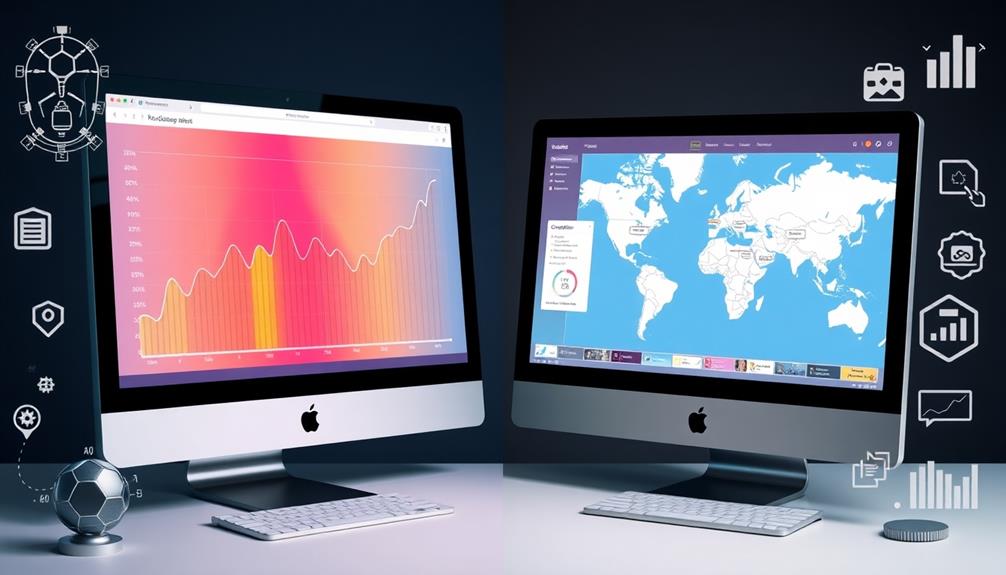To boost your website's SEO ranking, you can use various AI-driven strategies. Start with competitive analysis to uncover keyword opportunities and monitor traffic patterns. Use predictive analytics to optimize keyword selection and enhance content relevance. Personalizing user experiences keeps visitors engaged, while technical SEO improvements fix issues like broken links. Don't forget voice search optimization and local SEO techniques to reach broader audiences. Continuously adapt your strategies based on real-time data and measure your performance regularly. By implementing these tactics, you'll set yourself on the path to SEO success, and there's plenty more to explore.
Key Takeaways
- Utilize AI tools for competitive analysis to identify keyword opportunities and adapt SEO strategies based on competitors' performance.
- Leverage predictive analytics to optimize keyword selection and forecast user behavior for improved organic traffic.
- Implement content optimization strategies using AI to address content gaps and enhance relevance based on trending topics.
- Personalize user experiences with AI-driven recommendations to increase engagement and reduce bounce rates for better SEO outcomes.
- Automate SEO tasks and performance reporting to save time and ensure data-driven decision-making for continuous improvement.
Competitive Analysis and Benchmarking

When it comes to climbing the SEO ladder, understanding your competition is essential. By leveraging AI-powered tools, you can perform in-depth competitive analysis that reveals your rivals' search rankings, traffic metrics, and keyword performance. This insight allows you to benchmark your SEO performance against theirs, highlighting your strengths and weaknesses.
Regularly monitoring your competitors' total overhead variance can provide additional context to their operational efficiency, which may influence their online presence and SEO strategies.
Identifying keyword opportunities is vital, and AI can help uncover effective terms that your competitors are capitalizing on. You'll also discover content strategies that resonate with your audience, enabling you to fill content gaps and improve your market positioning.
Regularly analyzing traffic patterns and search visibility lets you adjust your proactive SEO strategies, ensuring you stay ahead of the curve. For instance, if you notice a competitor's rise in ranking for specific keywords, you can pivot your approach to include those terms in your content.
Moreover, continuous monitoring of competitor performance means you'll be quick to react to shifts in the landscape, adapting your SEO tactics accordingly. With AI guiding your competitive analysis and benchmarking efforts, you can make informed decisions that drive better results.
Predictive Analytics for Keywords

Predictive analytics for keywords is revolutionizing how marketers approach SEO strategies. By leveraging historical search data, you can forecast keyword performance and anticipate user behavior. This proactive approach allows you to adapt your keyword strategies based on emerging search trends, ensuring your content creation aligns with what users are actively seeking.
Here's a quick overview of how predictive analytics can enhance your SEO efforts:
| Predictive Analytics Benefits | Impact on SEO |
|---|---|
| Anticipates user behavior | Improves keyword performance |
| Identifies high-potential keywords | Increases organic traffic |
| Provides data-driven insights | Enhances long-term SEO planning |
Using AI-driven models, you can analyze vast datasets to uncover patterns that guide you in selecting keywords with favorable search volume and competition metrics. This leads to a more efficient allocation of resources, allowing you to prioritize keywords that are likely to yield the best results. By implementing predictive analytics in your keyword research, you not only enhance your keyword strategies but also position yourself for sustained success in the competitive digital landscape.
Content Optimization Strategies

Effective content optimization strategies are crucial for improving your website's visibility and engagement. By leveraging AI tools, you can enhance your content's SEO performance and guarantee it resonates with your audience. Here are some key strategies to reflect on:
- Utilize AI for keyword enhancements, identifying high-ranking keywords related to your niche.
- Detect content gaps using AI analysis, allowing you to create targeted content that aligns with trending topics.
- Implement keyword clustering to optimize your content around related terms, boosting your topical authority.
Continuous optimization is essential. AI-driven insights can help you adjust your content based on real-time data, keeping it relevant and engaging.
This approach not only improves search visibility but also enhances user engagement metrics, such as time on page and reduced bounce rates.
Furthermore, automating the monitoring of content performance enables you to quickly adapt to changes in search engine algorithms, ultimately improving your search rankings.
User Experience Personalization

As users navigate your website, personalizing their experience can greatly enhance engagement and retention. AI-driven user experience personalization tailors content recommendations based on individual user behavior, leveraging advancements in latest breakthroughs in machine learning tech. This approach can lead to a 20% increase in engagement rates on your optimized site.
With real-time adjustments, AI dynamically changes content according to user preferences, boosting user satisfaction and retention rates by up to 30%.
By implementing personalized content suggestions, you can increase average session duration by 25%. Users are more likely to explore related topics that align with their interests. AI-driven recommendation systems analyze user interactions to suggest relevant products or articles, resulting in a 15% boost in conversion rates for e-commerce sites.
Moreover, leveraging AI to create personalized browsing experiences can reduce bounce rates by 10%. This not only improves your site's SEO but also fosters a more loyal audience through tailored content delivery.
Embracing user experience personalization is essential for creating a website that resonates with your visitors, ultimately driving better results and higher rankings in search engines.
Technical SEO Improvements

Technical SEO improvements are essential for enhancing your website's performance and visibility in search engines. By leveraging AI tools, you can streamline your technical SEO audits and address issues that directly impact user experience and search rankings.
Here's how you can make significant strides:
- Identify and fix broken links (404s) to prevent user frustration and boost website performance.
- Utilize AI-driven schema markup to help search engines better understand your content, leading to rich snippets that enhance click-through rates.
- Optimize your metadata and alt text for images automatically, ensuring all elements adhere to SEO best practices.
AI can continuously monitor your site for undesirable patterns, such as high bounce rates, indicating technical issues needing resolution.
By conducting thorough audits, you can assess site architecture and indexability, ensuring search engine crawlers can navigate effectively. This proactive approach not only improves your search rankings but also fosters a better user experience.
Integrating these technical SEO improvements will set a strong foundation for your overall SEO strategy, driving more organic traffic to your site.
Automating SEO Tasks

Automating SEO tasks can transform how you approach your digital marketing efforts.
By streamlining keyword research, automating performance reporting, and enhancing content creation efficiency, you'll free up valuable time to focus on bigger strategies.
Implementing AI-driven techniques can also help in tracking content performance metrics, allowing for data-driven decisions that optimize your overall SEO strategy.
Let's explore how these automation techniques can elevate your SEO game.
Streamlining Keyword Research
In today's fast-paced digital landscape, marketers' time is invaluable, and leveraging AI tools can greatly streamline keyword research. By automating keyword research, you can save an average of 12.5 hours each week. This allows you to focus on higher-level strategies instead of tedious data collection.
Here are some benefits of using AI-driven platforms for your keyword research:
- Real-time insights: Get immediate data on keyword rankings and performance, enabling quick adjustments to your SEO strategies.
- Enhanced targeting: Tools like Semrush's Keyword Magic Tool provide extensive data on search intent, difficulty, and volume, helping you target effectively.
- Identify unoptimized content: AI tools can pinpoint content that lacks target keywords, allowing you to prioritize updates for better SEO performance.
Additionally, AI can forecast keyword performance using predictive analytics, helping you anticipate shifts in user behavior.
Automated reporting tools continuously track keyword rankings, keeping you informed and agile. By refining your keyword strategies with these insights, you can guarantee your content remains relevant and competitive in the digital space.
Embrace these AI-driven solutions to elevate your SEO game.
Automating Performance Reporting
Performance reporting can be a game changer for SEO teams, especially when you leverage automation. By automating performance reporting with AI tools, you can save an average of 12.5 hours per week. This allows you to efficiently track key performance indicators (KPIs) like organic traffic, conversion rates, and engagement levels.
AI-driven reporting tools continuously analyze data, enabling real-time adjustments to your strategies based on performance insights. This not only enhances decision-making but also considerably reduces human error, providing accurate, data-driven evaluations of your SEO campaigns. You can focus on strategic initiatives instead of getting bogged down by repetitive tasks.
Many AI tools, such as Semrush and HubSpot, offer customizable reporting features that highlight trends, keyword rankings, and competitor performance. This gives you thorough oversight of your campaigns.
With automation, you can quickly identify areas needing improvement, facilitating timely optimizations that directly impact your search rankings.
Enhancing Content Creation Efficiency
Boosting content creation efficiency is essential for any SEO strategy, and AI tools can help you streamline the process considerably. By automating various aspects of content creation, you can produce high-quality, keyword-rich articles that align with user intent while saving time.
- Automate repetitive tasks: AI can handle keyword tracking and performance reporting, freeing up an average of 12.5 hours each week for more strategic initiatives.
- Enhance content optimization: Tools like Semrush's SEO Writing Assistant evaluate your existing content for SEO performance, offering actionable recommendations for improvements.
- Leverage data analysis: Quickly identify content gaps and trending topics, allowing you to adjust your content strategies to meet the evolving interests of your audience.
Voice Search Optimization

Voice search optimization is becoming essential for anyone looking to enhance their online presence. With 50% of all searches expected to be voice searches by 2023, adapting your SEO strategies is vital. Voice queries are typically longer and more conversational, so incorporating long-tail keywords and natural language phrases can greatly improve your visibility.
To align your content with the question-based nature of voice searches, consider enhancing your FAQ sections. These sections not only answer common queries but are also favored by voice assistant users, who prefer quick answers. By providing clear, concise responses, you can increase your chances of being featured in voice search results.
Additionally, using structured data and schema markup helps search engine algorithms better understand your content's context. This understanding allows search engines to deliver precise answers to voice queries, boosting your organic traffic.
Incorporating these elements into your website won't only position you favorably within search results but also cater to the growing number of users relying on voice technology for their information needs.
Embrace voice search optimization, and watch your online presence thrive!
Local SEO Techniques

As you refine your online strategies, don't overlook the power of local SEO techniques. Implementing these strategies can remarkably enhance your visibility in local search results. Start by optimizing your Google My Business listings; this is vital since 46% of all Google searches seek local information.
Consider these effective local SEO strategies:
- Use localized keywords in your website content to improve search rankings for specific areas.
- Incorporate schema markup to help search engines better understand your content, driving rich snippets that can boost click-through rates by 30%.
- Engage local audiences by creating content around community events, as 78% of mobile local searches lead to offline purchases.
Additionally, encouraging customer reviews can greatly impact your reputation; businesses with positive reviews are 1.7 times more likely to be deemed trustworthy.
Continuous Learning in SEO

To stay ahead in SEO, you need to adapt your strategies based on real-time data.
By continuously analyzing user interactions, you can make iterative improvements that enhance your website's performance.
This approach not only keeps you aligned with ever-changing algorithms but also helps you seize new opportunities for growth.
Real-Time Data Adaptation
Dynamic adaptation is essential in today's fast-paced digital landscape, where SEO strategies must evolve in response to real-time user interactions and shifting search trends. By harnessing real-time data adaptation, you can leverage AI algorithms to guarantee your SEO efforts remain effective and relevant.
Consider these key benefits of a dynamic approach:
- Proactive optimization: AI can identify emerging keyword trends, allowing you to fine-tune your content quickly.
- Responsive strategy: With AI-driven insights, you can pivot your tactics as user behavior shifts, maintaining high search rankings.
- Performance measurement: Regularly evaluating performance indicators (KPIs) through AI tools helps you track your progress and make informed adjustments.
This constant analysis of user interactions enables you to optimize your content in ways that resonate with your audience.
By focusing on real-time data adaptation, you're setting yourself up for SEO success. The ability to process and analyze data instantaneously means you'll stay one step ahead of competitors.
Iterative Strategy Improvements
In the ever-evolving world of SEO, it's vital to embrace iterative strategy improvements that keep your approach fresh and effective. Continuous learning is key; regularly analyzing user interactions and search trends lets you adapt your keyword strategies based on real-time data. This proactive adjustment maintains your competitive visibility in search results.
Utilizing predictive analytics empowers you to forecast emerging keywords and topics, guaranteeing your content creation aligns with audience interests. This not only enhances engagement but also addresses user preferences effectively.
As you implement these iterative strategy improvements, focus on gradually refining your SEO tactics to optimize results. Measuring key performance indicators (KPIs) like organic traffic and conversion rates is important for guiding your decision-making process.
A mindset of continuous learning guarantees your strategies evolve alongside changing search engine algorithms, ultimately fostering long-term success in organic visibility. By staying attuned to shifts in user behavior and preferences, you can position your website for sustained growth and relevance.
Embrace this dynamic approach, and watch your SEO efforts yield impressive results over time.
Measuring SEO Performance

Measuring SEO performance is essential for understanding how well your strategies are working. By tracking key performance indicators (KPIs), you can assess the effectiveness of your SEO efforts. It's vital to establish baseline performance metrics before making changes, so you can clearly evaluate the impact of your strategies.
To effectively measure your SEO performance, consider these actions:
- Use tools like Google Analytics and Semrush to track website metrics.
- Regularly analyze organic search rankings for your targeted keywords.
- Implement real-time monitoring to stay updated on performance shifts.
These steps allow you to evaluate organic traffic, conversion rates, and engagement levels, ultimately informing your data-driven decisions.
With AI tools, you can automate the collection and analysis of SEO performance data, making it easier to adjust your tactics quickly. By continuously monitoring your website metrics, you can identify areas for improvement and refine your SEO strategies accordingly.
Frequently Asked Questions
How to Use AI to Boost Your SEO?
To boost your SEO, leverage AI tools for keyword research, optimize content based on data analysis, and automate technical tasks. Regularly track performance metrics to adapt strategies, ensuring your website stays relevant and competitive.
How Can I Use AI to Improve My Website?
You can use AI to enhance your website by automating tasks, analyzing user behavior, and personalizing content. Tools can streamline processes, provide insights, and help you adapt your strategy for better engagement and performance.
How Is AI Going to Change SEO?
Like a compass guiding you through a forest, AI's changing SEO by analyzing data patterns, predicting trends, and understanding user intent. You'll optimize content, automate tasks, and stay ahead of competitors effortlessly with its insights.
Is AI Content Good for SEO?
AI content can be good for SEO if it's keyword-rich and relevant. You'll need to guarantee it meets quality standards and addresses your audience's needs. Balance between efficiency and genuine value is essential for success.
Conclusion
Incorporating these AI-driven strategies into your SEO approach is like adding a secret ingredient to your favorite recipe. By embracing competitive analysis, predictive analytics, and user experience personalization, you're not just boosting your website's visibility; you're crafting a digital experience that resonates with users. Remember, the SEO landscape is always evolving, so keep learning and adapting. With a little finesse, you'll be well on your way to climbing those search engine rankings and attracting more visitors than ever before.










